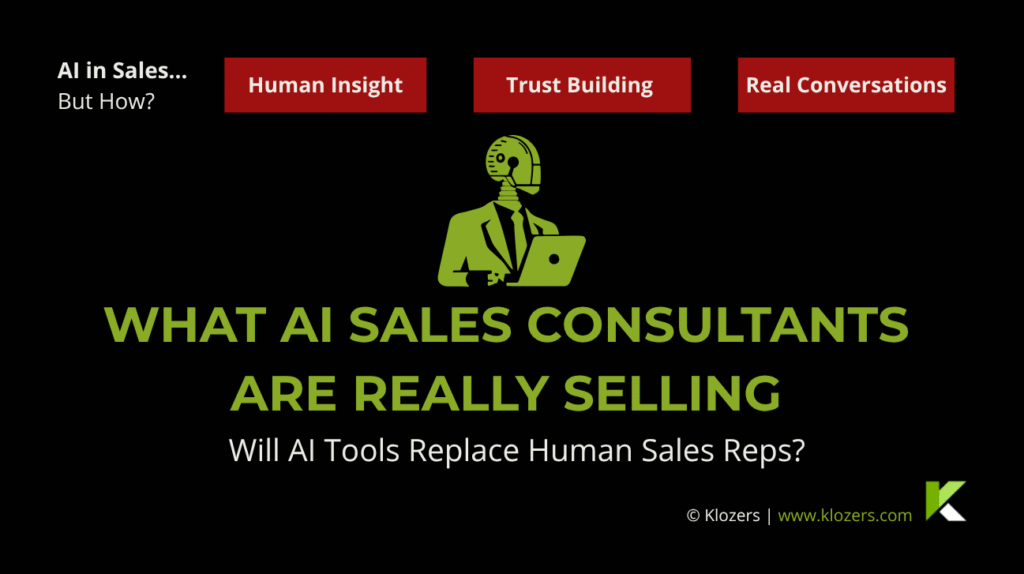AI SALES CONSULTANt - Top Question FRom Google
What Is The Job of an AI Sales Consultant?
An AI sales consultant is a professional who helps businesses implement artificial intelligence technologies to improve their sales processes and outcomes. They analyze your company’s existing sales processes to identify areas where AI can add value and recommend specific AI tools you can work with. In some cases, AI sales consultants also train sales teams on how to work effectively with AI tools.
Free access to our best tools and templates
Introduction: What AI Sales Consultants are Really Selling
Over the past few years, AI technology has been one of the hottest topics worldwide. You must be familiar with the common, understandable worry that AI tools will replace humans at their jobs. For many salespeople, it is becoming clearer that AI tools have come to stay in sales, with many companies hiring AI sales consultants to improve their sales strategies. The real question is whether human reps are still relevant. Let’s start by examining how AI is currently being used in sales.
The Current Role of AI in Sales
Generating Leads and Prospecting
Sales teams now use AI tools to find and connect with potential customers. These tools scan through data like patterns in customer behavior, company information, and market trends to identify prospects who are most likely to buy your product or service.
Many AI sales consultant services now focus on helping businesses set up these lead generation systems. The AI can automatically research companies, find contact information, and even predict which leads are ready to make a purchase. Tools like HubSpot’s Breeze Prospecting Agent and Seamless.AI use machine learning to validate contact information in real-time. This means sales teams always have accurate data to work with.
AI prospecting and lead generation tools work around the clock searching for new leads, updating contact information, and more based on their likelihood to convert. This means sales teams clock in with fresh, qualified leads ready for outreach. AI also helps sales teams personalize their strategy for each prospect. An AI sales strategy can analyze a prospect’s social media activity, company news, and industry trends to suggest conversation starters and relevant talking points. This level of research would take human reps hours to complete manually, but AI does it in seconds.
Sales Forecasting & Analytics
AI tools have made sales forecasting more accurate and reliable. AI systems can analyze previous sales data, seasonal patterns, market conditions, and various other factors to predict future sales performance with remarkable precision.
These forecasting tools help sales managers make better decisions about resource allocation, hiring, and goal setting. Sales teams can now use AI to understand which deals are most likely to close and when they’ll close, rather than relying on gut feelings.
AI analytics sales tools can also give insight into sales performance. Sales managers can quickly identify which reps are struggling, which products are selling well, and which markets offer the best opportunities.
Conversational AI and Customer Interaction
Chatbots and virtual assistants are now advanced enough to interact with many customers without human involvement. These AI systems can answer common questions, qualify leads, schedule meetings, and even guide prospects through the early stages of the sales process.
These AI tools understand context and can maintain natural conversations with prospects to a reasonable degree. They can remember previous interactions and escalate issues to human reps when necessary.
Voice AI is also becoming more common in sales. Some AI systems can make and receive phone calls, hold initial qualifying conversations, and even set appointments. These tools sound remarkably human and can handle multiple conversations simultaneously.
Account Management & Relationship Building
AI is also being used to help sales reps manage their existing customer relationships more effectively. AI account management tools can analyze customer usage patterns to identify opportunities for upselling or cross-selling. They can suggest the best times to approach customers about additional products or services, and even recommend talking points based on the customer’s current situation. The systems also predict which accounts might be at risk of churning. This allows sales reps to proactively address issues before they become serious problems.
For large enterprise accounts, AI can help sales reps stay on top of long buyer journeys involving multiple stakeholders to ensure nothing falls through the cracks.
Automating Administrative Tasks
One of the most immediate benefits of AI in sales is its ability to handle time-consuming administrative work. AI can automatically update customer records, log call notes, send follow-up emails, and generate reports. This frees up sales reps to spend more time actually selling.
AI systems can also listen to sales calls and automatically extract key information, action items, and next steps. They can update CRM systems in real-time and even suggest follow-up activities based on what happened during the conversation. AI can draft personalized emails based on the prospect’s profile, previous interactions, and current stage in the sales process.
Scheduling is another area where AI excels. Instead of the back-and-forth emails trying to find a meeting time, AI assistants can access calendars, suggest times, and automatically book meetings. Some systems can even reschedule meetings automatically when conflicts arise.
Human Sales Reps’ Strengths
Even as AI tools help improve efficiency and reduce manual labor in sales, human reps still have several irreplaceable strengths.
Emotional Intelligence and Relationship Building
The human touch will always be important in sales. People often buy from people they trust and connect with, and that requires the human element. Human sales reps excel at reading emotions and building genuine relationships with customers. They can pick up on subtle cues during conversations that AI might miss. They can sense when a prospect is hesitant, excited, or confused, and adjust their approach accordingly.
Customers want to feel confident that they have a real person they can rely on when issues arise or when they need support. Human reps can share experiences, relate to challenges, and build trust. These relationships often lead to repeat business, referrals, and long-term customer loyalty.
Problem-Solving and Consultative Selling
Human sales reps can think outside the box and adapt their approach based on specific customer needs. Consultative selling involves identifying the customer’s pain points and offering solutions. This requires deep industry knowledge, critical thinking skills, and the ability to see connections that might not be obvious to AI systems.
Human reps can also handle unexpected situations and objections that fall outside the scope of programmed responses. They can think on their feet, ask probing questions, and guide conversations in new directions based on what they learn during the interaction.
Negotiation and Persuasion
Negotiation requires human judgment, intuition, and the ability to read between the lines. While AI can provide data and suggest strategies, the actual negotiation process often takes human finesse.
Experienced sales reps understand when to be firm and when to be flexible. They can recognize win-win opportunities and can propose creative deal structures that satisfy both parties. Human reps can tell stories, create emotional connections, and present information in ways that resonate with individual prospects.
The ability to read the room during negotiations and adjust tactics in real-time is uniquely human. Sales reps can sense when to push harder, when to back off, and when to try a completely different approach.
Objection Handling and Difficult Conversations
Difficult conversations and objections during sales require empathy and being able to remain calm under pressure, all of which only humans can provide. Human sales reps can validate customers’ concerns and address objections in ways that feel natural and genuine.
When conversations become emotional or heated, human reps can de-escalate situations, show empathy, and work toward resolution. They can apologize when appropriate, take responsibility for mistakes, and rebuild trust when relationships are strained. These are situations AI might not fully grasp.
Future Outlook: AI vs Human
The future of sales isn’t about AI replacing humans, but rather about AI and humans working together more effectively. The most successful sales organizations are likely to be those that combine the efficiency and data processing power of AI with the emotional intelligence and skills of human reps.
The benefits of an AI sales consultant become clear when you see how AI tools improve sales outcomes by handling the routine, repetitive tasks. A report found that companies that use AI tools record up to 50% revenue growth compared to their peers. AI sales consulting will continue to grow as businesses seek to optimize this human-AI collaboration.
ACTIONABLE TIP
Actionable Tip: Use AI to Enhance Call Preparation
Rather than relying on AI for direct outreach or conversation, apply it to the pre-call research phase. Tools like Clay or Humantic AI can compile relevant prospect data—including company updates, recent activity, and communication preferences—within seconds.
This allows sales reps to approach each call with deeper context and more tailored messaging, improving engagement without increasing manual effort. It’s a practical example of how AI can streamline preparation while keeping the human element front and center.






